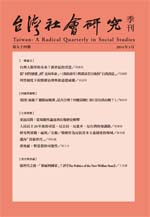
《台灣社會研究季刊》 第94期:

【一般論文】
台灣人類學的未來?新世紀的省思/黃應貴(94 民103.3 頁1-50)
這世紀以來,面對台灣新自由主義化的新發展,台灣的人類學是否能藉此新機會有所突破而避免被邊緣化?透過《「文明」之路》三卷對於東埔社布農人的個案研究成果,我們不僅可以斷定台灣地方社會與文化已有根本的改變而進入新的時代,更可以進一步確定台灣人類學在研究當代上的幾個主要困境:缺少歷史意識或時代意識的去脈絡化研究、既有現代性觀念的陷阱與包袱、被忽略的「心理學解釋之轉向」、缺少對於被研究對象的整體圖像之掌握、既成觀念的限制等等,均妨礙台灣人類學得以有效處理當代的新課題。解脫之道除了回到時代脈絡下的田野來面對現實,更需要回歸有廣度及深度且面面俱到的民族誌探討模式。另一方面,除了對於既有觀念的反省與新知識的創造外,更需要有綜合性的超越能力,以便掌握被研究對象的主要關懷,才有可能對於正在浮現中的多元中心之世界人類學有所貢獻。
關鍵詞: 新自由主義、東埔社布農人、去脈絡化、心理學解釋之轉向、整體圖像、民族誌探討模式、多元中心的世界人類學
Since this century, facing new development of neoliberalization in Taiwan, whether anthropology in Taiwan would utilize this chance to avoid being periherized? By the result of a study case of Taketonpu Bunun, we are not only sure that local societies and cultures in Taiwan have had fundamental changes and entered a new age, but also sure further that anthropology in Taiwan has had some major difficulties in studying the contemporary: lacking historical consciousness or the consciousness of the times makes the study de-contextualized, the traps and burdens of the concepts derived from modernity, neglected psychology’s interpretive turn, without holding the totality of the studied socio-culture, the limitation of our past thoughts, etc. These prevent us from treating validly new issues in the contemporary. The solution is to go back to our fieldwork in historical context or in the context of the times for the ethnography which is a mode of inquiry. Of course, this kind of ethnography is concerned with various aspects of the studied in necessary width and depth. On the other hand, besides reflection on the past thoughts and necessary reinvention or creation of new knowledge, we need more the capability to synthsize rather than analyze the data for finding out the studied’s major concerns by which we would contribute to the emerging world anthropologies with multiple centers.
Keywords: neoliberalism, the Bunun of Taketonpu, de-contextualization, psychology’s interpretive turn, the totality of the studied socio-culture, ethnography being a mode of inquiry, world anthropologies with multiple centers
從「同性戀愛」到「走向革命」:〈我的童年〉與郭沫若日後的「自我改造」/許維賢 (94 民103.3 頁51-106)
〈我的童年〉詳實記載郭在少童時期的同性戀愛經歷。本文對照不同版本的〈我的童年〉,把同性戀置於郭沫若一系列的自敘傳、詩文和私函進行追踪。本文發現走向革命後的郭,縱使在日後不斷對自己進行自我改造,也大量修改自己前期的作品。諸多刪改中,唯獨對〈我的童年〉的同性戀描寫只字未刪,這足見郭對同性戀即使從未張揚,但亦不刻意避諱。只字未刪不意味著作者對同性戀毫無愧疚。同性戀記憶對郭而言,始終是他在危難期間發憤而抒懷國家衰敗與革命挫折的徵候。晚年郭跟少年陳明遠的魚雁往返,不但可被視為〈我的童年〉返老還童的極度含蓄版,亦是他對革命挫折的自我救贖。本文也指出郭一生從「同性戀愛」到「走向革命」的徵候,這些「自我改造」不是學者以為的「自我昇華」,而是郭的「個體神話」邁向「集體神話」的「自我形塑」過程中,同性情慾的性能量,被極端國族主義壓抑變形後,不幸轉化為法西斯衝動的精神能量,朝向極權領袖強大磁場靠攏的結果。那是一種自我理想化的人格賦予愛國主義的形式。郭的同性戀在「自我改造」多年後,並沒有從根本上被革命論述去除,反而成為他每次面對革命挫折後,從理想化人格撤退到個人化人格的自我想像和自我保護。每當革命的進程面臨險境,他會潛意識地通過書寫,重新召喚被壓抑的同性愛慾望,作為一種對當下精神環境的回應。同性戀成為郭一生吸納與排除革命幻滅的情感力量依據。
關鍵詞: 郭沫若、〈我的童年〉、同性戀愛、自我改造、革命論述、法西斯衝動
The Years of my Boyhood records in detail Kuo Mo-jo’s adolescent homosexual experiences. This article compares different editions of The Years of my Boyhood and tracks his homosexual desires in the context of a series of his autobiographical writings, poetry and personal letters. This article finds that after he moved towards revolution, Kuo constantly reformed himself and modified his earlier works on a large scale. In the midst of all these revisions, only the description of homosexuality in The Years of my Boyhood remains totally unchanged. This indicates that although Kuo did not proclaim homosexuality, he did not avoid it either. The fact that not one character of these passages was changed did not indicate that the author felt no regret for his homosexuality. For Kuo, his homosexual memories are a symptom of his rage and emotion in a crisis period of national decline and revolutionary setbacks.
The correspondence between Kuo in his later years and the young Chen Mingyuan can not only be regarded as a highly implicit return to The Years of my Boyhood, but can also be seen as a type of self-salvation after revolutionary setbacks. This article also indicates the symptoms of Kuo’s move from homosexuality to revolution over his whole life. Kuo’s “self-reformation” is not a “self-sublimation” as some academics believe, but the “self-fashioning” process of Kuo’s “personal myth” as it shifts towards a “collective myth”. The sexual energy of homosexual desire was pressured and warped by ultranationalism until it became the spiritual energy of facist impulses, drawing Kuo into the powerful magnetic field of totalitarian leadership. It was an idealized self in an endowed form of patriotism.
Even after many years of self-reformation, Kuo’s homosexuality was never completely removed by revolutionary discourse, but rather became a means of self-imagination and self-protection every time he faced revolutionary setbacks and subsequently retreated from the idealized character to the personified character. Each time the progress of the revolution was threatened, he would subconsciously call up repressed homosexual desire through his writings as a response to the contemporary spiritual environment. Throughout Kuo’s life, homosexuality became the affectionate power with which he absorbed and dispelled the broken dreams of revolution.
Keywords: Kuo Mo-jo, The Years of my Boyhood, homosexuality, self-reformation, revolutionary discourse, facist impulses
列管制度下的醫療治理:「人類免疫缺乏病毒傳染防治及感染者權益保障條例」與新道德威權/ 黃道明(94 民103.3 頁107-146)
2007年頒佈、翻修自「後天免疫缺乏症候群防治條例」的「人類免疫缺乏病毒傳染防治及感染者權益保障條例」,因民間團體參與修法及增列權益保障條文而廣被視為愛滋人權倡議的里程碑。然而諷刺的是,1990年以來的高壓公衛防治措施(如愛滋罪刑化)不僅在此法下持續運作,把感染者當嫌疑犯監控的列管制度的重心也從公衛體系逐漸轉移到現行醫療院所施行的「愛滋個案管理師計畫」,衍生諸多權力效應。本文為「愛滋個案管理師計畫」政策的初探,企圖審視列管制度的本體轉化過程及其共構效應。我將論證,此照護政策浮現於2000年代中期非法用藥被問題化的環節;它宣稱以「病人為中心」,卻以一種擴散式的醫療監控模式運作,是國家規訓感染者、打造道德公民權的新式人口政治方案,而它和民間團體連結所造就的「愛滋個管服務產業」則刻畫了此刻的官、民協同治理。我的分析將關注環繞於性和用藥的污名,揭示愛滋列管體制的新道德威權如何以自我淨化的溫馨關懷進行治療支配,同時也詰問現下先行排除愉悅的愛滋人權格局。
關鍵詞: 愛滋、治理、列管、人口政治、用藥
Taiwan’s HIV Prevention Act in 2007 has been lauded as the landmark of human rights advancement and NGO advocacy, chiefly because of the inclusion of equal protection for HIV positive individuals. Yet ironically, all the punitive and stigmatising measures of public health control that have been in operation since the promulgation of the Act in 1990, measures such as name-based reporting, quarterly-based tracking, mandatory testing, and above all, the criminalisation of HIV transmission, remain firmly in place. Crucially the regime of name-based HIV Surveillance has also undergone a profound transformation under the new Act, thanks to the implantation of a certain Hospital-based HIV Case Management (HCM) Program in 2007. In this essay I offer a preliminary investigation into the apparatus of Hospital-Based HCM by examining its ontological transformations and constitutive effects in neoliberal Taiwan. Tracing its emergence to a context pertaining to the problematisation of drug use and harm reduction, I demonstrate how the apparatus, despite its claim to be ‘patient-centred’, operates as a diffuse form of medical policing in the state’s making of moral citizenship. Further, by marking out the apparatus’ linkage with the NGO sector, I point to the emergence of what I term the ‘AIDS case management industry’ and explicate its role in the intensification of HIV control. A biopolitical assemblage, this regime of HIV control, I argue, enacts a benevolent form of therapeutic domination that is premised on the logic of moral contagion. Contesting the self-purifying culture of compassion that the new regime of HIV control fosters, my analysis attends to the stigma around sex and drug use while questioning the foreclosure of pleasure in the enactments of HIV Rights in Taiwan today.
Keywords: HIV/AIDS, Governance, Name-Based HIV Surveillance, Biopolitics, Illicit Drug Use
【回應與挑戰】
基因(血緣)「擴散而稀薄」是否合理?回應黃樹仁的〈沒有唐山媽?拓墾時期臺灣原漢通婚之研究〉/陳叔倬(94 民103.3 頁147-153)
【左異聲響】
重返民間:從規範性論述到在地歷史解釋
編按/夏曉鵑(94 民103.3 頁155-156)
人民民主20年後的尋思:反公民、反進步、反台灣的知識路/甯應斌(94 民103.3 頁157-179)
研究與實踐:福利/公衛/醫療作為反抗資本主義制度的場域/陳美霞(94 民103.3 頁181-198)
邁向「資崩世代」/林柏儀(94 民103.3 頁199-212)
會後感:野思想的可能性/張立本(94 民103.3 頁213-226)
【書介與評論】
崩世代之後,「新福利國家」?評《The Politics of New Welfare State》/王兆慶(94 民103.3 頁227-240)

